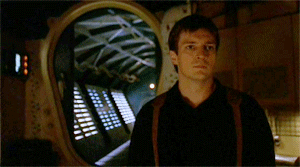In a nondescript rural corner of the American midwest, in a long row of units at one of the many dilapidated mini storage businesses that dot that dreary landscape, is a unit, Unit 232, with barely-noticable scratches in the concrete in front of the sliding door.
Upon closer inspection of Unit 232, the careful observer will note a few things: the frame around the door to the unit is dinged and bent up along its entire length, to the point that the door cannot be slid open even an inch; the door itself is curiously warped (some describe it as “pinched”) at the center, though not badly enough to see at first glance; the brown-tan paint covers up several much older layers that can be observed where chipping has occurred. An even more careful observer will discover that the entire row of units in which 232 is contained is of an older architectural style than the other rows, indicating that it alone has remianed in place possibly since the inception of the storage facility.
The owner, of course, has a story about Unit 232, although he doesn’t like to tell it. When he was much younger, someone rented the unit–he doesn’t recall who–and then disappeared after that, never paying the next month’s rent. Such things, the owner will say, happen often in his business, for all kinds of reasons, and so he and his boys clipped the flimsy lock from the unit along with several other unpaid lots a few weeks later, intending to sell its contents at blind auction and recoup some of their losses. Unfortunately, even with all three of them grunting and heaving at the door, it would not lift at all. Angry, the owner hired out some heavy machinery to tear the door down instead.
Behind the door, the owner says, was nothing but a solid wall of dull steel. The small backhoe tore the flimsy aluminum door out easily, but barely made a scratch in the metal. Exploratory cuttings elsewhere around the unit revealed that the same metal pressed against every wall. Whatever it was, it seemed practically bolted into the concrrete.
The next revelation was the discovery of a large, plain keyhole set into the block–which, the owner supposes, must actually have something else inside of it–on the side that faced the back of the unit. A locksmith was hired to examine the keyhole, but the moment he began feeling out the hole with his turning tools, he fainted clean away. When he came to an hour or so later, he was in such bad shape that his eyes would not focus and his tongue would not form words, and he was eventually committed to the county mental health ward (back when it was still called an asylum, the owner will say) where he managed to hang himself with a towel a few months later.
Having had quite enough of these goings-on, the owner called in a full-scale demolition service to take out the unit with a bulldozer, but when the vehicle arrived, the engine cut out and could not be started again until it had been towed some miles away. Spooked because of the story about the locksmith, which caused a small local media sensation at the time, the driver decided against trying a second time, and when word got round to the other heavy equipment companies in the area, the owner was left with no one to try and finish the job.
Naturally, he will say, he decided to rent the equipment and have one of his employees take care of it for him instead. But this is where he trails off, every time, and if you press him for the story of that worker, he will say nothing, only staring off out the window of his office as though you are not there at all. In the end, he will say, clearing his throat, he carefully re-paneled the walls, attached a new door, welded it in place and banged up the frame as an added precaution. The “pinching” at the center of the door, he will tell you, seems to happen on its own, but he has learned to stop asking questions about whatever is locked up inside that huge steel box.
Of course, every lock has a key somewhere in the world that fits it. What is inside the cube in Unit 232? Whoever has the key might know; more likely it has been passed along from attic to attic and rummage sale to antique shop so many times that whoever has it has no idea what it is for. Check your garage, basement, attic or junk drawers: almost everyone has a few big, old keys lying in a dark corner somewhere that he or she cannot recall the purpose of. Perhaps one of yours fits the lock hidden inside Unit 232….






 . Next time, you should go "I was fucking my BF for two hours straight this morning.", as that's probably what she thinks you were doing or something,
. Next time, you should go "I was fucking my BF for two hours straight this morning.", as that's probably what she thinks you were doing or something,  FOREVER ALONE
FOREVER ALONE